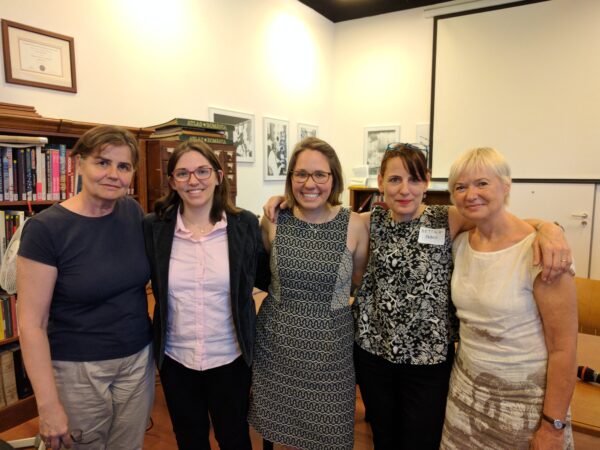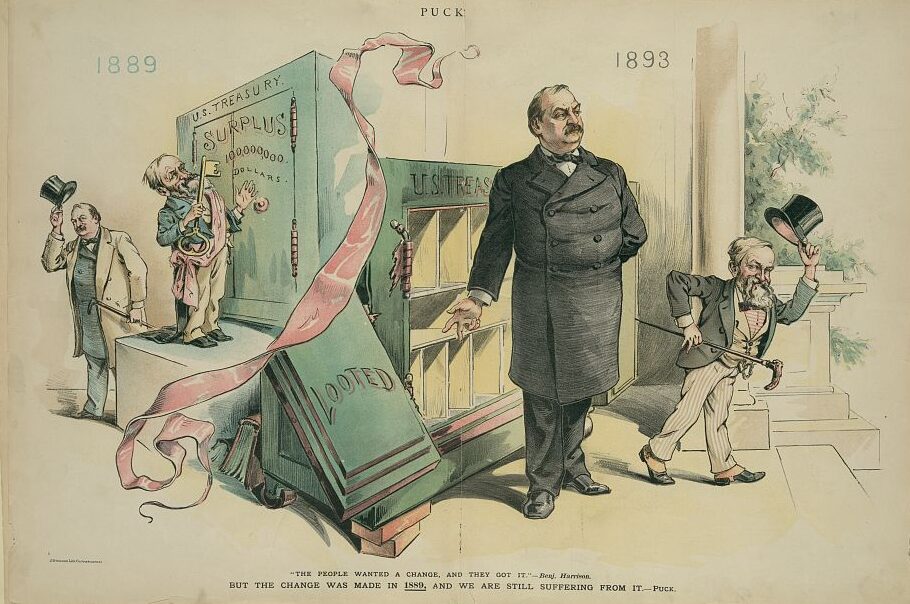To mark the 75th anniversaryof the Fulbright Program in 2021, Perspectives Dailyoffers a miniseries of personal narratives from historians about their Fulbright experiences.
Fulbright fellowships are awarded for a specific research project or teaching assignment, but grantees often form connections that they return to over the course of their careers. The two of us met and became friends as grantees to Hungary in 2009–10, when Leslie was working on her dissertation and Kristina was an English teaching assistant at Károli Gáspár Reformed University (KRE). This year together in Hungary shaped our careers far beyond the discrete objectives of our grants, leading us to adopt a collaborative way of doing history that has enhanced our work, our friendship, and our connections in Hungary and to the wider community of scholars engaged in central and eastern European studies.

Annamária Sas (Fulbright Hungary American Program Officer), Leslie Waters, Kristina E. Poznan, Bettina Fabos, and Márta Nagy (Fulbright Grantee to the Univ. of Iowa, 2015) at the 2017 launch of Proud and Torn at the Open Society Archives in Budapest. Courtesy Christopher Hewitt
Over that year, as the only two historians in the Fulbright student cohort, we visited museums, historical sites, archives, and libraries together. We ventured widely within Hungary and to Slovakia, where Leslie’s research (and later another Fulbright in 2016) took her and where some of Kristina’s family lives. A circumspect archivist who was wary of granting Leslie access to certain collections in the Kosice City Archive even came around once Kristina’s aunt vouched for her.
The phenomenal team at the Hungarian Fulbright Commission organized cultural excursions for the grantees throughout the year, adding to our opportunities for local immersion and facilitating long historical conversations on the train. We attended the annual paprika festival in Szeged, the holiday party of the Institute for International Education’s Europe office, and a book launch with journalist Kati Marton at the US ambassadorial residence. Many of Kristina’s KRE students and EducationUSA advisees became our mutual friends: Nóra Fülöpp became Leslie’s Hungarian tutor; Karolina Tóth studied for the TOEFL and SAT exams with us and went on to an undergraduate degree at the University of Evansville; and István Szokonya became a Fulbrighter himself to Boston University.
The opportunities for cross-disciplinary learning accompanied the cross-cultural exchange.
When Kristina returned to Austria and Hungary on a research Fulbright in spring 2013, in order to conduct research for her own dissertation, Leslie was able to meet that year’s Fulbright cohort as well, forging more connections. On a field trip to the southern Hungarian town of Pécs to tour an iconic pottery factory, hosted by the Hungarian Fulbright Commission, Kristina started chatting with Bettina Fabos, a communication and media studies professor from the University of Northern Iowa, who was working on a visual timeline of Hungarian history through the story of a rural family and their unique collection of early amateur photographs that documented everyday life on a small farm. The conversation turned into an opportunity for both of us to consult on the project, Proud and Torn: A Visual Memoir of Hungarian History. It was our first foray into digital history and the public humanities more broadly.
The opportunities for cross-disciplinary learning accompanied the cross-cultural exchange. Bettina attests that she learned far more about the complexity of history in working with us on the project, while we learned about photomontage, parallax scrolling, and scholarly work in visual communication and interactive digital media. Proud and Torn allowed us to use some of what we had learned during and since our 2009 Fulbright, and challenged us to think about the ways that a visual family memoir was informed by, but not the same as, academic history. Returning to Hungary on other fellowships during future summers, we found ourselves in archives in the morning and reviewing Proud and Torn draft chapters in the evenings, assigning Bettina more and more of our own previous comps reading, and digging through the public library to learn more about Marcali, the market town where the story is set. The result of our collaboration was a 16-chapter interactive visual timeline that showcased amateur and archival photographs instead of canonical images, offered a rural counterpoint of Budapest-centric narratives, and represented the experiences of women across Hungary’s tumultuous history.
The Fulbright experience continues to shape our career trajectories, even as we have finished our PhDs.
Eight years after our initial arrival in Hungary, we returned to Budapest to launch Proud and Torn at the Open Society Archives. Other Fulbrighters will confirm that the connections forged during their grant periods are long-lasting: several staff members of the Hungarian Fulbright Commission were in attendance, alongside members of our 2009 and 2013 grantee cohorts and Hungarian colleagues who had gone on Fulbrights to the United States. We introduced the students on Bettina’s University of Northern Iowa team to the city, to Hungary’s Lake Balaton (where much of Proud and Torn takes place), and to some of the individuals showcased in the project itself. Animator Isaac Campbell subsequently applied for his own Fulbright student grant to Hungary, for which Leslie served as a recommender. We dutifully prepared a list of our favorite haunts for him.
The Fulbright experience continues to shape our career trajectories, even as we have finished our PhDs and coincidentally landed in the Southwest. Leslie, teaching European history at the University of Texas at El Paso, has recently published her book, Borders on the Move (Univ. of Rochester Press, 2020) and is preparing a second book and a podcast series on the 1992 Olympics and the post-communist transformation of eastern Europe. Kristina, after a year of teaching public history at New Mexico State University, continues to work predominantly in digital history on Enslaved.org and with Bettina on the amateur photo archive Fortepan Iowa, the first sister site to the original Fortepan project in Hungary, while preparing her own book manuscript based on her Fulbright research in Hungary and Austria.
Our year together in Hungary led to projects and collaborations we never would have envisioned otherwise. In this long year of limited travel, we still don’t know when we can return to Hungary again, but we’re certain our Fulbright friendship, now 11 years strong, will lead to even more adventures and collaborations in the future.
Leslie Waters is assistant professor of history at the University of Texas at El Paso; she tweets @leslie_h2Os. Kristina E. Poznan is managing editor of the Journal of Slavery and Data Presentation, based at the University of Maryland.
This work is licensed under a Creative Commons Attribution-NonCommercial-NoDerivatives 4.0 International License. Attribution must provide author name, article title, Perspectives on History, date of publication, and a link to this page. This license applies only to the article, not to text or images used here by permission.


